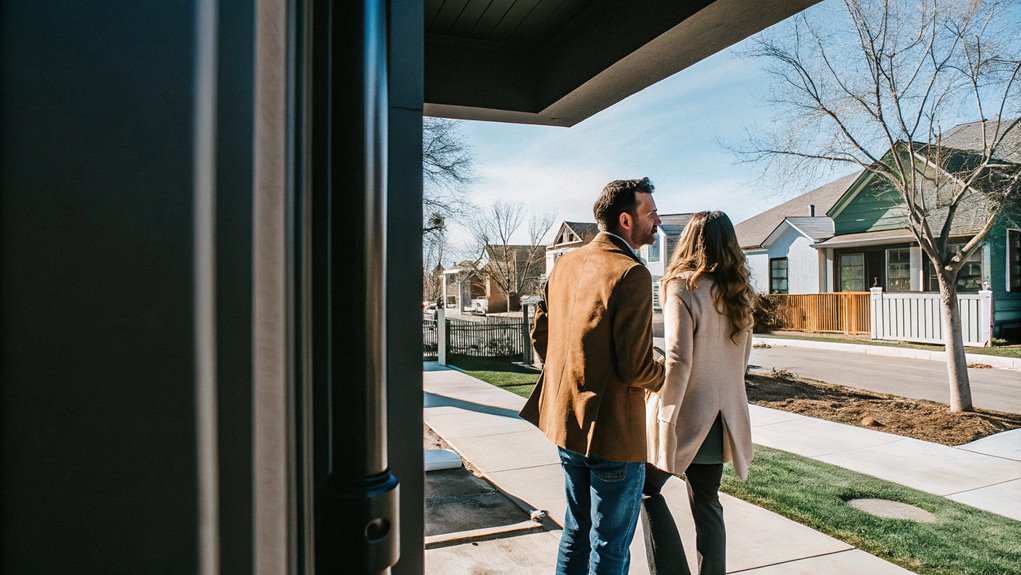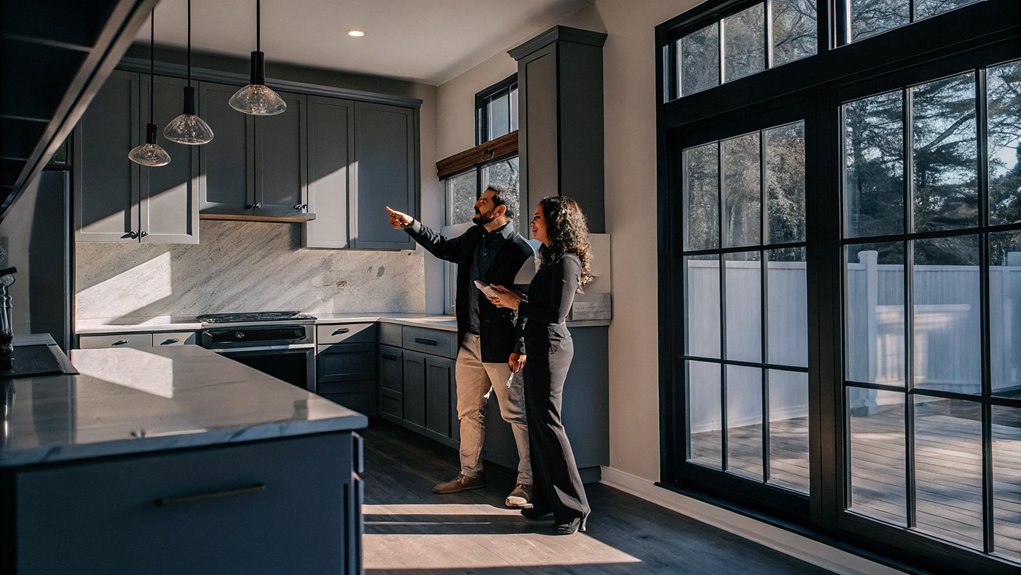When you want to find a home that will grow in value, look at these five simple things:
Check if the area is getting better. Look for new buildings and stores going up nearby.
See what you can fix in the house. Small changes like a new kitchen or bathroom can make the house worth more money.
Look at home prices in the area. Are they going up? This tells you if other people want to live there too.
Watch for new roads and train lines being built. When it gets easier to get around, homes often cost more.
Ask about tax breaks. Some areas give you money back when you buy or fix up a home.
By looking at these things before you buy, you can pick a home that will be worth more later.
Ready to start building equity in your own Michigan home? Get your personalized home loan quote today.
Neighborhood Growth Indicators

Look for signs that show a neighborhood is growing. These things help tell if house prices might go up.
Watch if new shops and homes are being built. See if roads and parks are getting better. When these things happen, it can mean good changes are coming.
Look at the people who live there. Are more people moving in? Do they make more money than before? Are the schools good? These things matter a lot.
Check if big companies are moving to the area. See if new buses or trains will make it easier to get around. Watch how fast homes sell and what they cost.
Look at how safe the area is. See what kinds of buildings can be built there. These things help people decide if they want to buy homes in the area.
Michigan residents, unlock the door to your new home. Request your home loan quote from Treeside Financial today.
Property Improvement Opportunities
When you buy a house, you can make it worth more by fixing it up.
Look for homes that need work, like empty basements or old kitchens. Even dusty attics can become nice rooms with some work.
Before you start any project, think about how much money you'll get back. A small kitchen update gives back most of what you spend. Turning a basement into living space also pays off well.
Look at how rooms flow into each other. Can you knock down walls to make spaces bigger?
Maybe you can add a new room or turn the garage into something else. But first, check if your town and neighborhood rules allow these changes.
Local Market Analysis

Property watching is a lot like being a detective. You need to look at how home prices change over time in your area. Check how long houses stay for sale and what people pay for rent.
Look at what's going on in your town. Are more people getting jobs? Are new families moving in? Are they building new roads or schools? Good signs are when more people work, make more money, and new shops open up.
Look at houses like the one you want to buy. See what they sold for. This helps you know if the price is fair.
If you want to rent out your house, check if people need places to live. Find out how much rent costs and who likes to rent in that area. This tells you if you can make money as a landlord.
Infrastructure Development Plans
Looking at a home's future value? Check what's being built nearby.
New trains, buses, and better roads can make it easier to get around. When stores and offices move in, homes close by often become worth more money.
New schools, libraries, and fun places for the neighborhood also help make homes worth more. These changes make life better for everyone who lives there too.
Future Transit Projects
When new trains and buses come to a city, homes nearby can cost more. A lot of people want to live close to easy ways to get around.
Look up what your city plans to build in the next few years. Check if they want to add new train stops or fast bus lanes. Most homes near these new stops go up in price by quite a bit.
Go to your city's website. Look at their big plan for getting people around town. See which plans have money to be built. Watch for news about when they'll start and finish building.
The best spots are where many bus or train lines meet. These areas often have the most people wanting to live there.
Commercial Zone Expansions
When new stores and shops come to town, nearby homes become worth more money. Before you buy a home, look at what stores and offices will open in your area. Check within 3 miles of the house you want to buy. Big stores and business parks bring jobs and new people to live nearby.
Keep an eye on places where big stores like Target or Walmart plan to build. When they come, other shops and places to eat follow them. The best time to buy is about 1-2 years before these new places open.
Also look at how many empty stores are in the area. When stores fill up with new shops, home prices often go up too.
Public Facilities Upgrades
When a town builds new things like schools or parks, nearby homes become worth more money. Keep an eye on what your town plans to build next. New schools, libraries and bus stops can make home prices go up by a lot.
Look for places where the town wants to build many new things at once. A spot might get both a park and new water pipes. This makes homes worth even more.
Ask your town office about their building plans. They can tell you about water plants, power lines and fire stations coming soon. The best spots to buy a home are where the town will build many new things in the next few years.
Resale Value Factors

When you buy a home, some things make it worth more when you sell it later. Good schools nearby make homes sell for more money – often 20% more. Safe streets and being close to jobs help too.
Simple house styles that look nice over time are better than new fancy ones. Most people want homes with three or four bedrooms and more than one bathroom. A nice yard and how the house looks from the street matter a lot.
Look for homes you can make bigger later. A basement or attic you can fix up gives you ways to make your home worth more money down the road.
Tax Benefits and Incentives
Owning a home helps you save money on taxes. When you make payments on your home loan, you can lower your taxes. You can deduct the interest you pay on loans up to $750,000.
The property taxes you pay on your home can also help cut your taxes. If this is your first home, you might get even more tax breaks.
Both the U.S. and your state may offer special deals to help you buy your home for less money.
Mortgage Interest Tax Deductions
When you own a home, you can pay less in taxes by using something called the mortgage interest deduction. This means the money you pay in interest on your home loan can help lower your taxes.
If you bought your home after December 15, 2017, you can use this for loans up to $750,000. For homes bought before that date, you can use it for loans up to $1 million.
You save the most money on taxes in the first few years of your loan. This is because you pay more interest during those years.
To get this tax break, keep track of your interest payments. Your bank will send you a paper called Form 1098 each year that shows how much interest you paid.
Ask a tax helper to make sure you do this right.
Property Tax Write-Offs
When you own a home, you can save money on your taxes by writing off your property taxes. This means you can pay less in taxes each year. The government lets you take money off your taxes for what you pay in property taxes, up to $10,000.
Each area has its own tax rate. Some places like Hawaii have low rates at 0.28%. Other places like New Jersey have high rates at 2.49%.
To know how much you can save, take the tax rate where you live and times it by how much your house is worth.
These tax savings help you spend less on your house each month. This makes owning a home cost less than you might think. It's smart to think about these savings when you plan to buy a house.
First-Time Buyer Credits
Buying your first home can be easier with special money-back deals from the government. These deals help you save money when you buy a house. Each state has its own deals. Some cities do too. The biggest deal can give you up to $15,000 back on your taxes.
To get these deals, you mustn't have owned a home in the last three years. You also need to make less than a set amount of money. You must live in the house as your main home. You need to stay there for at least 3-5 years.
You can use FHA home loans with these deals. This helps you save even more money.
Check your state's website to find more ways to save. You might find help with down payments or lower loan costs.







